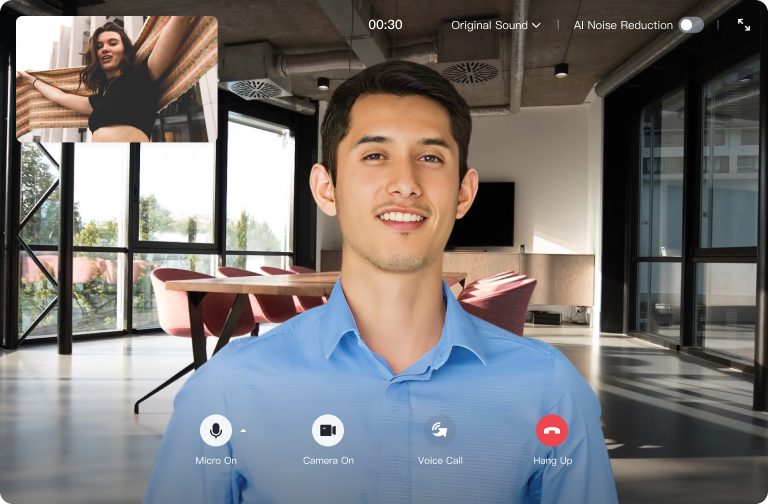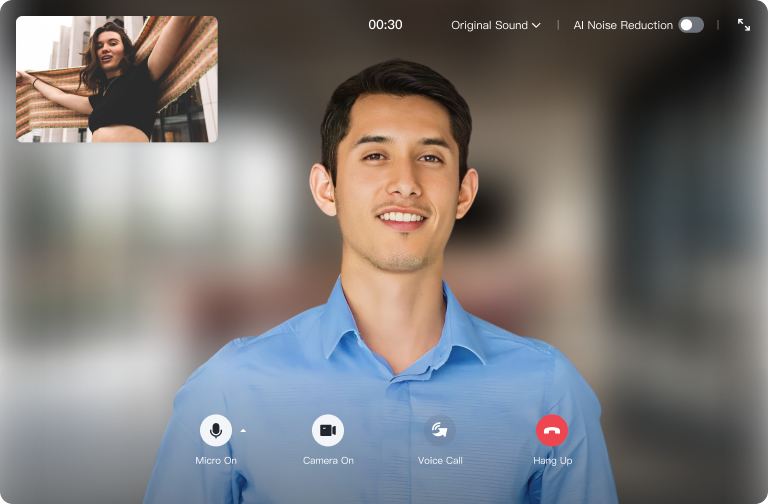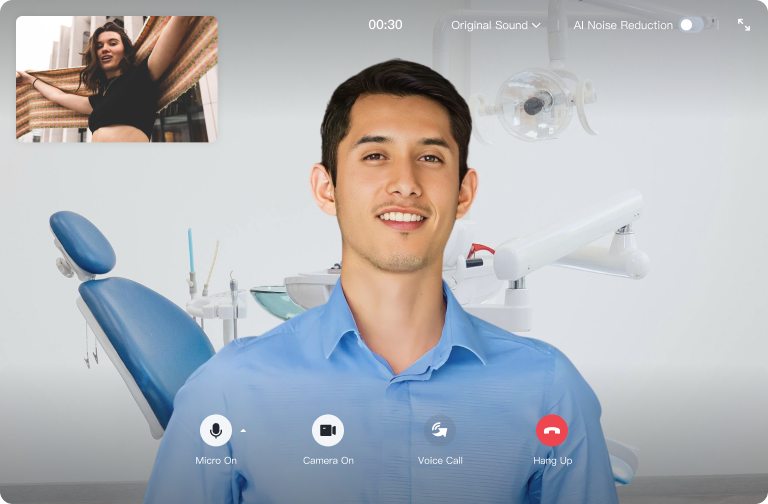Tencent Real-Time Communication
- Release Notes and Announcements
- Product Introduction
- Purchase Guide
- Monthly subscription
- Monthly Packages
- Pay-as-you-go
- Refund Instructions
- Video Calling (Including UI)
- Run Demo(TUICallKit)
- Integration (TUICallKit)
- Calls integration to Chat (TUICallKit)
- Offline Call Push (TUICallKit)
- Flutter
- Additional Features(TUICallKit)
- Multi-Person Call
- Floating Window
- Beauty Effects
- Custom Ringtone
- Monitoring Call Status
- Language Settings
- Solution (TUICallKit)
- Server APIs (TUICallKit)
- REST API
- Third-Party Callback
- Callback Configuration
- Legacy Documentation
- Call Status Callback
- Client APIs (TUICallKit)
- uniapp(Android&iOS)
- Release Notes (TUICallKit)
- FAQs(TUICallKit)
- Multi-Participant Conference (with UI)
- Run Demo(TUIRoomKit)
- Integration(TUIRoomKit)
- Screen Sharing (TUIRoomKit)
- Schedule a meeting (TUIRoomKit)
- In-meeting Call (TUIRoomKit)
- Virtual Background (TUIRoomKit)
- Conference Control (TUIRoomKit)
- In-Conference Chat (TUIRoomKit)
- Enhanced Features (TUIRoomKit)
- Text Watermark
- Client APIs (TUIRoomKit)
- iOS&Mac
- Android
- Electron
- Flutter
- RoomEngine API
- Server APIs (TUIRoomKit)
- REST API
- User Management
- Third-Party Callback
- Callback Configuration
- User Related
- Seat Connection Related
- Live Streaming (Including UI)
- Customizable Interface (TUILiveKit)
- Client APIs (TUILiveKit)
- Android
- UIKit API
- iOS
- UIKit API
- Web
- Electron
- Flutter
- API-Example
- Video Live(LiveStreamCore)
- Server APIs (TUILiveKit)
- REST API
- Room Related
- User-Related Matters
- Battle Related
- Third-Party Callback
- Callback Configuration
- User Related
- Seat Connection Related
- Voice Chat Room (with UI)
- Client APIs (TUICallKit)
- Android
- UIKit API
- iOS
- UIKit API
- API-Example
- Server APIs (TUILiveKit)
- REST API
- Room Related
- Integration (No UI)
- SDK Download
- API Usage Guidelines
- SDK Quick Start
- 01. Importing the SDK
- 02. Entering a Room
- 03. Subscribing to Audio/Video Streams
- 04. Publishing Audio/Video Streams
- 05. Exiting a Room
- 06. Advanced Guide
- Sensing Network Quality
- Setting Video Quality
- Rotating Videos
- API Reference Manual
- iOS and macOS
- Android
- All Platforms (C++)
- Electron
- Flutter
- Unity
- React Native
- Advanced Features
- Utilizing Beautification Effects
- Testing Hardware Devices
- Testing Network Quality
- Custom Capturing and Rendering
- Custom Audio Capturing and Playback
- Event Callbacks
- Enable Watermark
- Server APIs
- Room Management APIs
- Stream mixing and relay APIs
- Data Monitoring APIs
- Pull stream Relay Related interface
- AI Transcription APIs
- Making API Requests
- Call Quality Monitoring APIs
- On-cloud recording APIs
- Usage Statistics APIs
- Appendix
- Console Guide
- Application Management
- Monitoring Dashboard
- Development Assistance
- Solution
- Real-Time Chorus
- Solution Overview (TUIKaraoke)
- TUIKaraoke APIs
- FAQs
- Legacy Documentation
- Protocols and Policies
DocumentationTencent Real-Time CommunicationVideo Calling (Including UI)Virtual Background (TUICallKit)Web
Web
Last updated: 2024-07-09 16:08:59
TUICallKit has launched a new feature for virtual backgrounds, allowing users to set a blurry or image background during video calls. This hides the real calling environment, protects privacy, and makes the call more interesting. Next, this article will detail how to use this feature in the TUICallKit component.
Integration effect
The display effect of the TUICallKit component after integrating the virtual background feature is as follows.
Original Camera | Blurry Background Effect | Image Background Effect |
 |  |  |
Preparation Requirements
Before using the Virtual Background feature provided by Tencent Cloud, you need to visit the Console to activate Audio and Video Services for your application and purchase the
Group Call package. For specific steps, please see Activate Service.Enable Blurry Background
TUICallKit's UI design supports setting a blurry background. By calling the following interface, you can display a feature button for the blurry background on the UI. Clicking the button will directly enable the blurry background feature.
Note:
H5 is not supported yet, only PC supports it.
v3.2.4+ support.
import { TUICallKitServer } from "@tencentcloud/call-uikit-vue"; // take @tencentcloud/call-uikit-vue for exampleTUICallKitServer.enableVirtualBackground(true);
Setting Image Background (Optional)
Implementing the image background requires users to save the image locally. After saving, call the following interface for setting (currently, only images with a local path are supported, images of uri are not supported yet).
import { TUICallKitServer } from "@tencentcloud/call-uikit-vue"; // take @tencentcloud/call-uikit-vue for exampleTUICallKitServer.getTUICallEngineInstance().setVirtualBackground(imagePath: string)
FAQs
Enabling blurry background has no response or is delayed
Ensure you have purchased the audio and video call
Group Call package, see Activate Service.When the network is poor, the virtual background model file may not be completely downloaded, resulting in failure to open the virtual background.
Can the virtual background be turned on if the camera is turned off?
Not available.
Was this page helpful?
You can also Contact Sales or Submit a Ticket for help.
Yes
No

